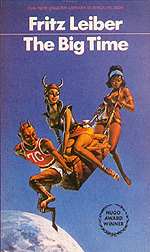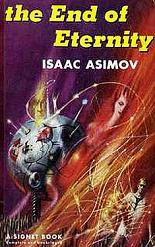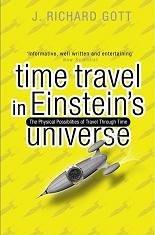
The Big Time
Fritz Leiber
127 pages
published in 1961
Rereading Asimov’s The End of Eternity remonded me of another time wars novel, a far more cynical and modern one: Fritz Leiber’s The Big Time. And since I had never read a Leiber novel during all the time I’ve kept my booklog, I thought it was time to start. I had read this novel before, first in Dutch, then in English and been impressed by it. Nor was I the only one: in its original, magazine publication in 1958 it so impressed the fans that it won a Hugo Award, which is high praise indeed.
The Big Time is a somewhat unconventional science fiction novel, in that it’s staged as a one room play, with the stage fixed while characters move on and off it. Which means that all the action that doesn’t happen in the room has to be described in dialogue between the characters, which of course has a distancing effect. For a genre which often takes pride in creating awe inspiring, inventive and strange settings and then making them believable to the reader, this is an audacious trick. Leiber takes this huge idea of a time war, in which history is in constant flux and which spans billions and billions of years throughout the universe and only shows us glimpses of it. You wouldn’t think it would work, but it did.

